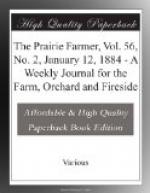“Melican man callee John. Hump. Yik Kee.”
So with due consideration for his feelings we addressed him as Yik Kee. He was of great use. He helped take care of the children, did the washing (Mary did not fancy his method of sprinkling clothes) and helped Jack on the farm. We made him one of the family. He was always pleasant and smiling, but was a man of few words.
Cousin Jack added much to his income by trading in hides. Ranchmen living at a distance sold their hides to him and Jack sold them to traders who came around at certain times in the year. Harry White was a partner in the business. He used to go on a sort of round-up and visit the ranches all over the country. The cattle of the ranchmen roamed in vast herds over the plains, protected only by the brand of the owner. Cattle stealing was frequently practiced. Offenders in this respect were shown no mercy. They were convicted, tried, and executed only in the court of Judge Lynch. I never blamed the ranchmen for this; it was impossible to guard the herds in the vast area over which they traversed, and the cattle must be protected in some way. Gil Mead was a wealthy ranchman, who lived about ten miles from us. He owned the largest herd of cattle on the plains. They were branded with the vowels of his name. E.A., which could be recognized anywhere. He always shipped his cattle East to his brother in Chicago. I feared the man. He was tall and gaunt, with deep-set black eyes and low forehead. His home was unhappy; his wife cross and ugly, and his children wild and unruly. This made him more than commonly disagreeable.
I think it was in the fall of ’74 that Harry White brought the big load of hides to Jack. Both were much pleased at the bargain they made. Harry gave glowing accounts of a new customer—a ranchman from Chicago, who had taken up an abandoned homestead. He had purchased many cattle from his cousin, Gil Mead, and hoped to rival him in the number and quality of his herd. Jack packed the hides away to keep till December, when we expected the dealer.
One afternoon, not long after this, Gil Mead rode up to the house, looking very agreeable and pleasant. A couple of strangers, also ranchmen, were with him. They wanted to look at the hides, one of the men being a trader, Gil said. Jack was in Denver, so Yik Kee and I went to the barn with them. They looked the hides over carefully, and conversed in low tones, Gil with a suppressed oath. Finally they thanked us courteously and took their leave.
“Hump; no goodee,” said Yik Kee, but he wouldn’t say any more.
At five that evening, when we were at supper, a crowd of twenty-five or thirty men rode up on horseback. Jack came out and met them, inviting them in to take supper, in his generous, hospitable way. They wanted him to go to Denver with them, there was to be a meeting there of importance to ranchmen. The meeting would be at eight. They had brought with them an extra horse for Jack. Mary looked around for Yik Kee to help her, but he had mysteriously disappeared.




